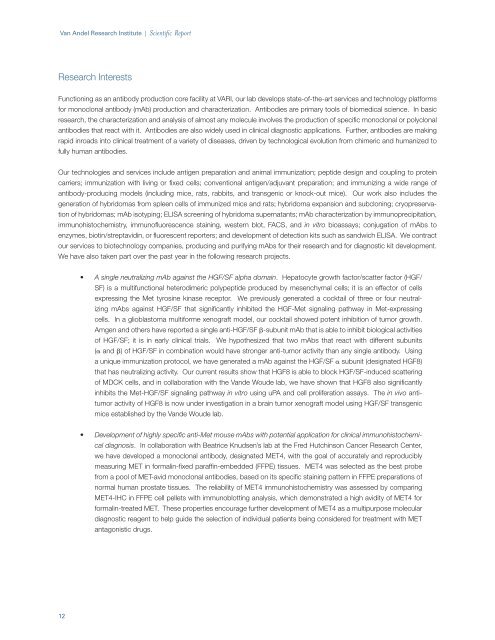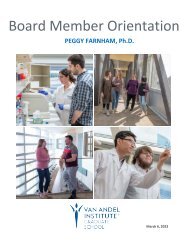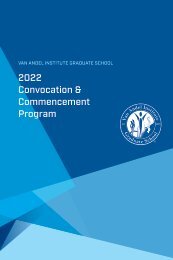2009 Scientific Report
Create successful ePaper yourself
Turn your PDF publications into a flip-book with our unique Google optimized e-Paper software.
Van Andel Research Institute | <strong>Scientific</strong> <strong>Report</strong><br />
Research Interests<br />
Functioning as an antibody production core facility at VARI, our lab develops state-of-the-art services and technology platforms<br />
for monoclonal antibody (mAb) production and characterization. Antibodies are primary tools of biomedical science. In basic<br />
research, the characterization and analysis of almost any molecule involves the production of specific monoclonal or polyclonal<br />
antibodies that react with it. Antibodies are also widely used in clinical diagnostic applications. Further, antibodies are making<br />
rapid inroads into clinical treatment of a variety of diseases, driven by technological evolution from chimeric and humanized to<br />
fully human antibodies.<br />
Our technologies and services include antigen preparation and animal immunization; peptide design and coupling to protein<br />
carriers; immunization with living or fixed cells; conventional antigen/adjuvant preparation; and immunizing a wide range of<br />
antibody-producing models (including mice, rats, rabbits, and transgenic or knock-out mice). Our work also includes the<br />
generation of hybridomas from spleen cells of immunized mice and rats; hybridoma expansion and subcloning; cryopreservation<br />
of hybridomas; mAb isotyping; ELISA screening of hybridoma supernatants; mAb characterization by immunoprecipitation,<br />
immunohistochemistry, immunofluorescence staining, western blot, FACS, and in vitro bioassays; conjugation of mAbs to<br />
enzymes, biotin/streptavidin, or fluorescent reporters; and development of detection kits such as sandwich ELISA. We contract<br />
our services to biotechnology companies, producing and purifying mAbs for their research and for diagnostic kit development.<br />
We have also taken part over the past year in the following research projects.<br />
• A single neutralizing mAb against the HGF/SF alpha domain. Hepatocyte growth factor/scatter factor (HGF/<br />
SF) is a multifunctional heterodimeric polypeptide produced by mesenchymal cells; it is an effector of cells<br />
expressing the Met tyrosine kinase receptor. We previously generated a cocktail of three or four neutralizing<br />
mAbs against HGF/SF that significantly inhibited the HGF-Met signaling pathway in Met-expressing<br />
cells. In a glioblastoma multiforme xenograft model, our cocktail showed potent inhibition of tumor growth.<br />
Amgen and others have reported a single anti-HGF/SF b-subunit mAb that is able to inhibit biological activities<br />
of HGF/SF; it is in early clinical trials. We hypothesized that two mAbs that react with different subunits<br />
(a and b) of HGF/SF in combination would have stronger anti-tumor activity than any single antibody. Using<br />
a unique immunization protocol, we have generated a mAb against the HGF/SF a subunit (designated HGF8)<br />
that has neutralizing activity. Our current results show that HGF8 is able to block HGF/SF-induced scattering<br />
of MDCK cells, and in collaboration with the Vande Woude lab, we have shown that HGF8 also significantly<br />
inhibits the Met-HGF/SF signaling pathway in vitro using uPA and cell proliferation assays. The in vivo antitumor<br />
activity of HGF8 is now under investigation in a brain tumor xenograft model using HGF/SF transgenic<br />
mice established by the Vande Woude lab.<br />
• Development of highly specific anti-Met mouse mAbs with potential application for clinical immunohistochemical<br />
diagnosis. In collaboration with Beatrice Knudsen’s lab at the Fred Hutchinson Cancer Research Center,<br />
we have developed a monoclonal antibody, designated MET4, with the goal of accurately and reproducibly<br />
measuring MET in formalin-fixed paraffin-embedded (FFPE) tissues. MET4 was selected as the best probe<br />
from a pool of MET-avid monoclonal antibodies, based on its specific staining pattern in FFPE preparations of<br />
normal human prostate tissues. The reliability of MET4 immunohistochemistry was assessed by comparing<br />
MET4-IHC in FFPE cell pellets with immunoblotting analysis, which demonstrated a high avidity of MET4 for<br />
formalin-treated MET. These properties encourage further development of MET4 as a multipurpose molecular<br />
diagnostic reagent to help guide the selection of individual patients being considered for treatment with MET<br />
antagonistic drugs.<br />
12
















